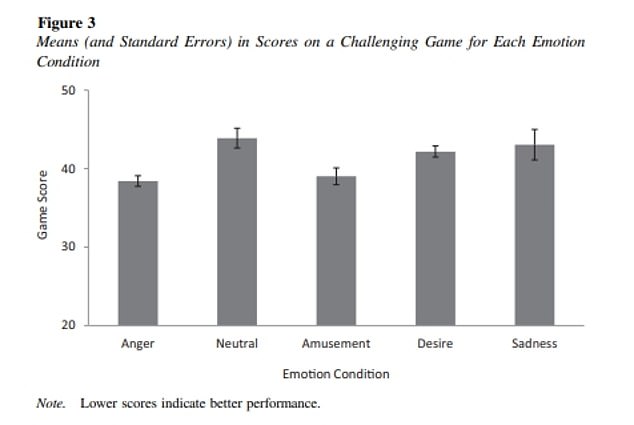Want to achieve your goals? Get angry because it makes you try harder, scientists say
- Research showed that images of people provoke amusement, sadness, longing or anger
- When people were angry, they solved 39 percent more anagrams
If you want to perform well, getting angry can help.
When people are angry, they tend to put more effort into achieving their goals, experts think.
One study recruited 233 college students and showed them images that were either neutral or intended to provoke amusement, sadness, desire, or anger – for example, by insulting their university’s football team.
They were then given a series of tricky anagrams that they had to decipher in twenty minutes and find the words they contained.
When people were angry, they solved 39 percent more anagrams correctly.
If you want to perform well, getting angry can help. That’s because experts believe that when people are angry, they tend to put more effort into achieving their goals (stock)
They seemed to try harder because they spent more time on the more difficult anagrams, rather than giving up.
However, a second experiment showed that people also cheated more often on tests when they were angry.
Professor Heather Lench, who led the research at Texas A&M University, said: ‘People often believe that a state of happiness is ideal, and the majority of people consider the pursuit of happiness an important life goal.
‘The view that positive emotions are ideal for mental health and well-being is prominent in lay and psychological accounts of emotions, but previous research suggests that a mix of emotions, including negative emotions such as anger, leads to the best results.’
Humans may be evolutionarily programmed to respond to anger with action to overcome an obstacle.
The new study, published in the Journal of Personality and Social Psychologycombined five separate experiments involving more than 1,000 volunteers.
In another experiment, the goal was to achieve high scores in a skiing video game, with one easy version involving only jumps, while another, more difficult version required avoiding flags on a slalom course.
In the more complicated game, anger resulted in better scores compared to when people were kept in a neutral emotional state.

When people were angry, they solved 39 percent more anagrams correctly

A second experiment found that people were also more likely to cheat on tests when they were angry (stock)
But this was not the case in the less challenging game.
However, angry people had faster reaction times when asked to press a button in response to a shape appearing on a screen.
Although anger was associated with greater success across the study, amusement or desire were also associated with greater goal achievement in some cases.
Professor Lench said: ‘People often prefer to use positive emotions as tools rather than negative ones, and tend to view negative emotions as undesirable and maladaptive.
‘Our research adds to the growing evidence that a mix of positive and negative emotions promotes well-being, and that using negative emotions as a tool can be particularly effective in some situations.’
In addition, researchers found that people were more likely to vote in elections if they said they would be angry if their candidate did not win.
